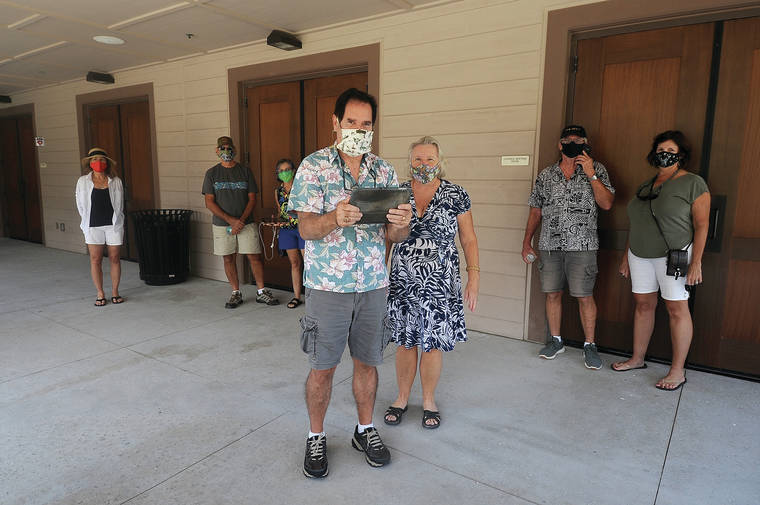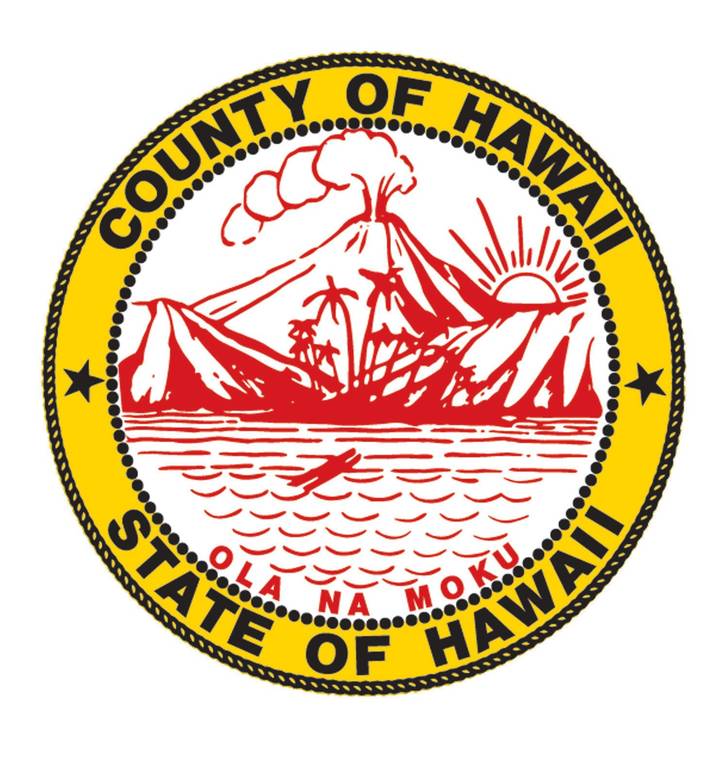A heavy and sometimes controversial agenda, coupled with technical problems during a global pandemic, brought a new set of challenges to the County Council last week, during a meeting that saw testifiers grumble about lack of access and a mayor appear to step outside his lane to advise council members on Sunshine Law issues.
The pandemic safety measures, required under emergency proclamations from the governor and the mayor, limit the number of people allowed in council chambers and require masks, which are often slid down when participants are speaking, drinking or snacking.
Council members have been split since March between Hilo and Kona council chambers, but repairs in the Kona council chambers have forced three or four council members into a cramped conference room outside the public eye, except when they’re on video screens during live streaming.
Nerves were obviously frayed Tuesday as an 11-hour day of confirmation hearings dragged on.
Testifiers milled around outside council chambers at the West Hawaii Civic Center, hoping to attend the meeting, or at least testify in person, but their only option was testifying in writing or using Zoom.
“I tried to testify earlier and I was dropped. I gotta tell you this is a public hearing — we’re entitled to be here — and I am standing outside the council chamber and there’s no facility for us to testify. We’re having to use equipment that people don’t have; we have to use expertise that uneducated people don’t have and people with disabilities,” said David Blancett-Maddock, an attorney and former deputy prosecutor, panning his tablet to show the small crowd outside the doors. “This is discriminatory against older people who don’t have this ability. … If you take a look around me there’s people here that can’t testify today. They’re just standing here because they can’t get in to testify.”
Tiffany Edwards Hunt, a former West Hawaii Today reporter who was outside Hilo council chambers to watch the action after she testified on a mayoral appointee, said she talked to Council Chairwoman Maile David and former Chairman Aaron Chung about her concerns.
“Consider that we need to do something about the public having to watch council members through the window. We need to give people the option of coming down to the council chambers or civic center to participate in the process without feeling like they are outsiders looking in,” Hunt posted to a Big Island Press Club Facebook page. “It was pathetic watching those elderly people fumbling with their iPads in West Hawaii. … The legislative branch of government is the people’s branch, our opportunity to petition the government for redress.”
David said Friday that meetings in Kona council chambers are suspended while a “long overdue” upgrade to video streaming technology is completed. That should be finished by mid-February, she said.
“Meetings are conducted consistent with the law and maximizing public participation. Efforts have been made to minimize the number of people in our meeting rooms to adhere to health and safety protocols while allowing council to conduct business,” she said in text messages to West Hawaii Today. “We continue to use various resources to provide effective public access options to all meetings of the council and look forward to the time when we are able to safely welcome our citizens back into our meeting rooms, as we fully recognize the value of public participation.”
The legislative branch is separate from the executive branch and the council and administration each have their powers and responsibilities outlined in the county charter.
But Roth, before introducing one of his Cabinet appointees, turned to the West Hawaii council members and asked that they keep their microphones on. The state Sunshine Law requires council business to be conducted in public view, except for limited circumstances such as discussing litigation and personnel matters during previously called executive sessions.
“We noticed during the last appointments there was a lot of conversations going on over there. And you know just the perception of propriety and to make sure there’s not anything out there,” Roth said. “I’m not saying that anything was said that shouldn’t be said but I think until we have the room fixed and we can have people outside and the public there it would be a good idea to keep the microphones on for all the meetings.”
David appeared taken aback by Roth’s comment.
“I think in the past when we’ve had them on in the meetings we were asked to turn our mics off,” replied David, who was in the room with Kona Councilwoman Rebecca Villegas and North Kona Councilman Holeka Inaba, “but if Mayor Roth wants us to leave it on then that’s fine. I believe we can do that if everyone in Hilo leaves theirs on as well.”
Roth said he doesn’t think it’s necessary in Hilo council chambers because “everybody is here and there’s a whole bunch of other people, so there’s not a lot of conversation going on between the council members.”
“Until we have that room fixed, I think it makes a lot of sense,” Roth continued. “We don’t want things coming back because of appearance and things like that.”




